CTP Episode of the Day - 08.16.06
Today's Cherished Episode: all things (7x17)
Original Air Date: April 9, 2000
Written By: Gillian Anderson
Directed By: Gillian Anderson
The chance encounter with a man from her past leads Scully on a voyage of personal and spiritual discovery.
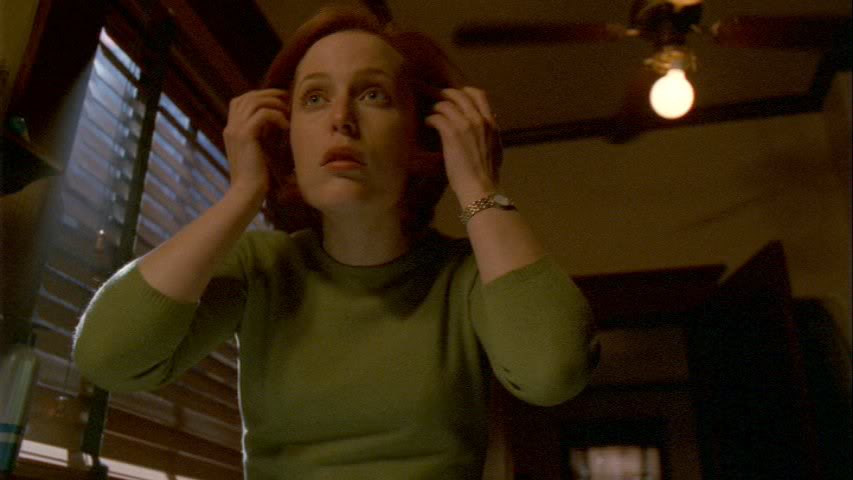
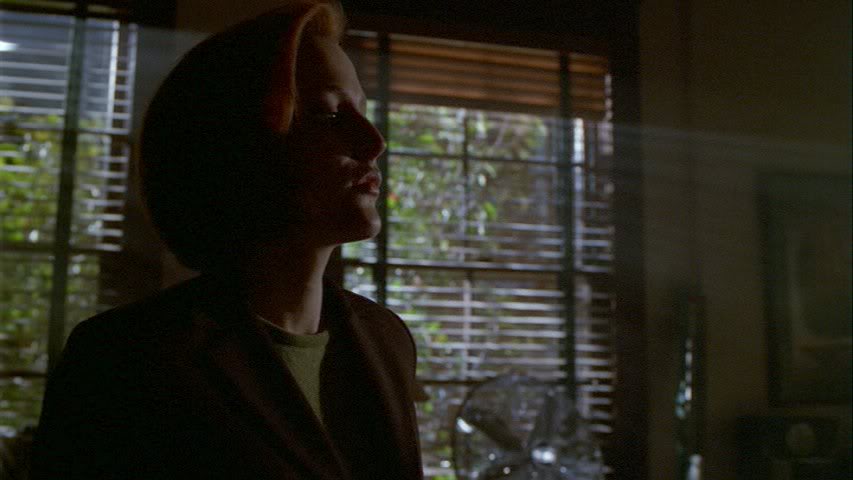
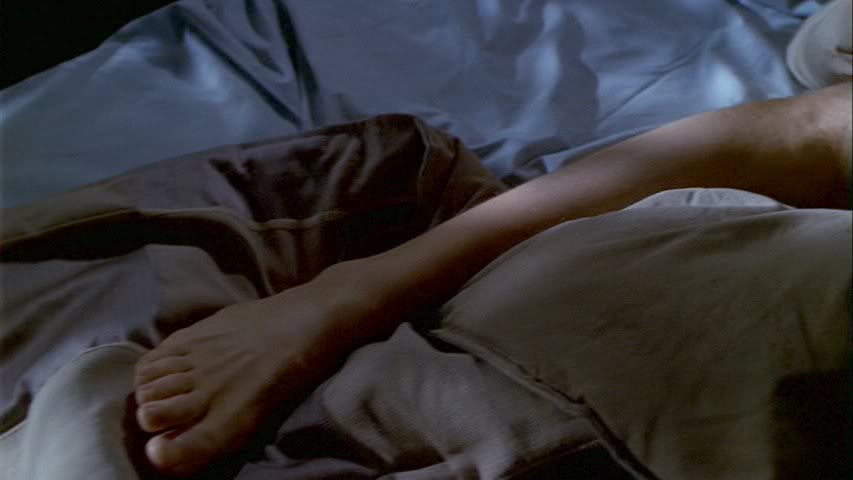
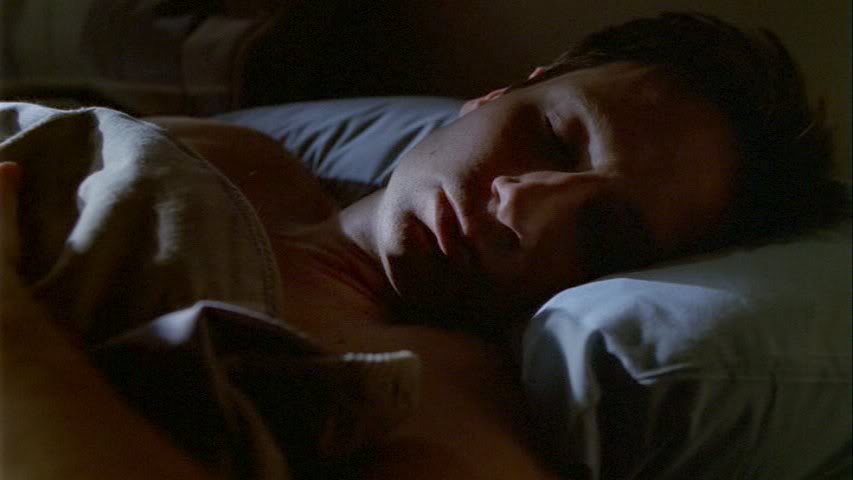
Time passes in moments ... moments which, rushing past define the path of a life just as surely as they lead towards its end. How rarely do we stop to examine that path, to see the reasons why all things happen, to consider whether the path we take in life is our own making or simply one into which we drift with eyes closed. But what if we could stop, pause to take stock of each precious moment before it passes? Might we then see the endless forks in the road that have shaped a life? And, seeing these choices, choose another path?
Some "all things" Tidbits & Musings:
-- Gillian Anderson approached Chris Carter during Season 6 with the desire to write and direct an episode. "We were, of course, supportive of that," said Carter. "You want to support those people who have added to the show and give them their shot to go to the next creative level." Anderson recalled that during this period she was also getting offers from a number of cable networks to direct. "But suddenly it occurred to me that the best scenario would be for me to learn the ropes with what was right in front of me and what I was most familiar with. I talked about this with my manager and she asked me if I had any ideas."
-- Anderson did indeed have some ideas. Long an advocate of New Age/alternative lifestyles, the actress had particularly strong beliefs in Buddhism and the power of spiritual healing. What she shared with her manager was the early outline of a deeply personal X-File, one in which Scully is taken down a spiritual path when logic fails her as she attempts to deal with an interlude from her pre-X-Files life. The tone of her early vision for "all things" was stark, yet subtle. Scully was on a voyage of self-discovery that she would have to make on her own.
-- Anderson related, "A certain concept began to form, and as soon as I got off the phone with my manager, I just wrote the entire outline for 'all things' right then and there, it all just kind of came together on the page."
-- The next day, Anderson went into Chris Carter's office and pitched the idea. "Gillian's idea was a real change for the X-Files," Carter said. "It was very personal and quiet, but you could tell that the ideas were very close to her and that they were important."
-- Anderson also used the meeting to reiterate her desire to direct the episode as well. But the actress recalled that Carter's instinct was to take this very risky journey one step at a time. "Chris told me, 'Okay, let's see. Why don't you start writing. When you've written something, we'll look at it and see what we can do'."
-- Weeks later, Anderson came back to Carter and executive producer Frank Spotnitz with her first draft of "all things." As befitting a maiden effort in writing, the script had problems. "When I turned in the script, it was fifteen pages too long and it didn't have a fourth act," groaned Anderson at the memory. "It ran about 88 minutes and it could have been a two-parter, but there wasn't room for another two-parter on the schedule."
-- Spotnitz and Carter worked very closely with Anderson in the rewrite stage, walking that inevitable tightrope of wanting to keep Anderson's vision intact while having it all fit into the mandated 44 minute time slot. Spotnitz remembered the rewriting process: "We talked about it and changed things, all in service of her ideas about healing and Buddhism. A lot of what I did with her was the distilling of her ideas."
-- Carter agreed with Spotnitz. "Frank and I worked very closely with her on that script. But in the end, it was all Gillian. We were there more as backstops and she would throw things at us. Frank and I were very pleased with the courage of her convictions."
-- Anderson's next challenge was directing. It would be a relatively Mulder-lite show (as David Duchovny was busy prepping his own episode, "Hollywood A.D.") and the rhythms and beats of her character and the show were almost second nature to her after six-and-a-half seasons. But she cheerfully admitted that she needed help from everyone in the cast and crew.
-- As for directing, "I got my hands pretty dirty," Anderson explained. "I was there for casting, for location scouting. I actually had a few days of work the episode before "all things", so other people went out and scouted locations when I couldn't do it myself. They brought pictures back to me. But basically I was there for the whole process. On the set, I was actually pleasantly surprised by how much had sunk in over our seven years. I also had one of our directors, Kim Manners, as my right-hand person, who led me through it. If I had any questions, I would go to Kim. The first thing he said was, 'Okay, you've got homework to do. I want you to spend the next two weekends doing an entire shot list of every single moment and every single scene'. That really appealed to me, because I'm obsessive-compulsive in that way. Drawing little diagrams and controlling characters in terms of where they're going is just up my alley. So I really enjoyed that process."
-- Casting director Rick Millikan recalled guiding the actress-turned-director through some of the intricacies of the other side of the camera. "I loved working with Gillian," he said. "It was fun for me to watch her go through the casting process because it was all new to her. She had never done the casting thing and she was like a little kid who you had to teach. At first she was a little embarrassed sitting there with the actors. But as she got used to the audition process, she did really well."
-- Anderson wielded a deft hand in her directorial debut, prodding the actors to her will, making decisions on the fly, and handling the complex special effects sequences surrounding Dr. Waterston. Kim Manners was always around the set and available for any questions or to suggest how a shot might go. And when it came to directing herself, Anderson was right on the money.
-- There were some pleasant surprises for Anderson while she was actually on the stage, calling the shots. No one pulled any practical jokes on her and everyone was supportive. That included David Duchovny, who was only needed for one and one-half days of work. "He was only in the wrap around stuff," Anderson said. "He was very gentle and non-judgmental. It was nice."
-- According to Anderson herself, the episode title "speaks to that which is innate in everything, and the unity of life energy and all of us and of all things."
-- Anderson designed the opening shot of the episode (which started with darkness and the sound of the dripping faucet before showing Scully in the bathroom) to be the first hint of "rhythmic sound" that would permeate the episode. She felt the continuation of sound throughout the episode "added to the musicality of the show."
-- I think we can all agree that this is the episode that put the "tease" back in "teaser"!!
-- On her DVD commentary for "all things," Anderson notes: "When I first wrote this episode, it did not hint at the fact that ... or the notion that Mulder and Scully had spent the night together. But at some point Frank Spotnitz had come to me and said that around this time in the season they were thinking that it might be a good idea to imply that, and it might be possible to add that into the script. That's how that came about, that Scully starts this episode basically in Mulder's bathroom putting on her clothes and the insinuation that they have indeed spent the night together."
-- In filming the scene of Mulder in bed, Anderson noted, "It was actually quite funny. I wanted the rain and the tree knocking against the window [to continue the idea of rhythmic sound], and the greensman got quite enthusiastic with the tree and shrubbery, so it sounded like a hurricane going on outside Mulder's window."
-- "I was driving home one night after work and listening to Moby," Anderson said, "and this song started playing. It was even way early on in the writing of the episode, but I knew it was important that I use it and I was determined that we were going to use this track ["The Sky is Broken"]. And the more I listened to the words and the dialog, the more it fit with my idea for the script." (And the pulsing beat adds to that rhythmic sound she was looking for.)
-- Anderson explained that the crop circle idea developed when she was trying to find something important enough to take Mulder away from Scully but something that would also tie into what Scully was going through in the episode. "I started researching and asking people to research crop circles," Anderson said. "Frank Spotnitz helped a lot with the crop circle aspects just in terms of what would be important to take Mulder away but something that Scully would eventually find interesting."
-- The Mandelbrot Set that Mulder mentions in his slide show is one of the most widely recognized icons of the field of chaos, dynamics, and fractals. It is named after Benoit Mandelbrot who constructed (via computer) the first images of the set in 1978.
-- In her DVD commentary, Anderson noted that it was important that Scully be disinterested and "have an attitude" during Mulder's slide show in order to show Mulder and Scully at odds early on in the episode to juxtapose Scully's relationship with Waterston. "Scully's eventual relationship with Waterston appears to have more positive than negative attributes and her relationship with Mulder has more negative than positive," Anderson notes, "because Mulder has pulled her from the medical profession, he tells her to do things or assumes that she will do things, whereas Waterston loves her. But as the course of the episode goes on, we find actually that even though Waterston loves her, he actually has a stronger hold on her in terms of what she should be and should do in her life than Mulder. It's actually her relationship with Mulder that helps to guide her on some level down her spiritual path."
-- Mulder's line to gain the disinterested Scully's attention during his slide show ("and I'm not wearing any pants right now") is not in the original script.
-- Anderson revealed there was a fishing wire attached to Mulder's burrito wrapping in order to make it fall to the floor on top of the slide projector button so the light and the rhythmic clicking of the slides would continue.
-- The rhythmic tapping of the pencil continues one of the through lines of the episode, though Anderson confessed she was "never quite satisfied with how the pencil effect was working."
-- As the nurse at the desk hands Scully what will turn out to be the wrong envelope, Anderson uses another tool that will be a constant throughout the episode: slow motion to indicate the "suspended moments in time where Scully comes to some type of realization or notices there's something she needs to be paying attention to in these moments. These are moments when Scully has an opportunity to make a decision one way or another that ends up affecting her life considerably."
-- I have to confess that it wasn't until I watched this episode a second or third time that I noticed the woman who handed Scully that fateful envelope was the same blonde who would pop up later in the episode to make sure Scully was paying attention. On the DVD commentary, Anderson said, "The idea for that woman started with that one scene where Scully almost gets run over by the truck and the woman who walks across the street in front of her car essentially saves her life. Working through writing the script, we realized this woman was actually the paranormal aspect of the episode and thus it was important to explore that since this is a show about paranormal activity. So we had to play up this woman's involvement in the episode; and where initially it was just one scene with the car, we found places to add her in to play out that through line. So in essence, she starts the ball rolling by handing Scully that envelope."
-- But just in case you weren't paying attention, there was a big sign that said "PAY ATTENTION" behind the nurse's station.
-- Scully amusingly ducks behind a copy of "Feng Shui Life" to avoid being spotted near Daniel's room. Feng Shui means "wind and water" in Chinese.
-- On the DVD commentary, Anderson said, "It was really wonderful to work with Mark Snow in the post process with the music. I had given him a couple of CDs and asked him to come up with something that had certain flavors to it, and then we sat down in post and got to add certain types of sounds. The pinging sound when Scully pulls back the curtain and sees Waterston was Mark's idea, and it was a wonderful effect. He did a tremendous job on the music and just the whole mood of the show and the music actually became Scully's theme and continued a little bit into the next season after David wasn't there any more and Scully was out on her own."
-- The toggle swinging in the breeze continues the rhythmic through line. "I have one of these in my possession," Anderson laughed. "Love that toggle. Look at all that texture." She explained that the weight of the toggle was very important because it had to have weight to it as it swung back and forth.
-- Anderson explained that it was important to her to have Mulder on speaker phone as opposed to just talking on the phone so Scully could hear the movie playing in the background. "I had Paul Rabwin find some black and white movie where somebody says something about breaking my heart," she said, another sign for Scully to pay attention to. She added with a laugh, "I think originally I had David packing a basketball too for wherever he was going, but it became too big and bulky and was kind of silly."
-- A nice touch that during one shot of Packing!Mulder we see the pencils stuck in his bedroom ceiling. Nice to know he doesn't confine his pencil tossing practice to the office.
-- As the toggle swing changes to slow motion, marking one of those suspended moments when Scully had to make a decision one way or another, Anderson said, "The whole figuring out of how to make these suspended moments work without making them cheesy or pointing to them too much was quite a dilemma for me as a director." Anderson added, "I love what Mark did with the music in those moments too, and the worldliness of it. There's something very Tibetan about the gong sound which was appropriate for this episode."
-- A nice weaving of the Moby lyrics, "Speak to me [Scully]" into the episode dialog (though the line is not in the original script).
-- In her DVD commentary, Anderson noted, "There are so many different parts of the process of directing, like how to start the opening of scenes and coming off objects and movements, and I wanted things to always be moving and cyclical. The gurney wheel was part of that."
-- The idea of Scully walking into the wrong room when she goes to the hospital to see Daniel was used as juxtaposition. "The wrong room has a warm glow and people are obviously sharing love and respect and honoring someone who's in the hospital room, and Scully catches a moment of that," Anderson said. In contrast, Waterston's room is very stark, cold, and gray. "Despite their obvious past emotional connection, everything around it is indicating that it's not a direction Scully should be going in," Anderson continued. "She should be going toward the warmth and not the cold, but it's hard to see those things when one's heart is engaged."
-- Despite her satisfaction with "all things," Anderson still regrets that the necessary script cuts were made at the expense of a clearer understanding of the relationship between Scully and Dr. Daniel Waterston. "There was so much more dialogue and so much more than I wanted them to say to each other," Anderson explained. "And in fact, in the filming, they did say those things to each other. I had to take out about 10 minutes in the editing process to cut the episode down to the correct length."
-- In the episode as aired, Scully is painted as the "other woman" whose affair with Waterston broke up his family. But Anderson revealed that she originally had a different vision for the back story. "What had actually transpired between Scully and Waterston was that there had been an attraction and that they were starting to spend some time together, things like lunch and dinner dates. She was trying to keep it platonic but there were feelings that were coming up. It started getting heavier and Waterston began talking about divorce. But Scully didn't want to be a homewrecker. At one point, another professor approached her and told her that their relationship was starting to get around and that it could hurt her career and his marriage. So Scully ended it and left town before anything could happen physically. That's when she made the decision to move to Washington and go to Quantico, and not to pursue the medical profession because it reminded her of Daniel. She loved him very much but was distracted by him, and she also was not willing to ruin a marriage. And after she left, he completely shut down and became very depressed, so that his wife and daughter thought he was having an affair."
-- In Anderson's original story, the wife accused Waterston of having an affair with Scully, he denied it, but the wife went home and hung herself above their bed. Maggie Waterston found her mother's body and blamed Scully for her mother's death. "That's where Maggie's anger came from," Anderson explained. "So in taking out that aspect of the story, it was confusing as to why Maggie was so angry, but there was a part of that we needed to keep in order to move the story forward." Anderson chuckled, "You can see I'm still emotionally attached to my part of the story, but these are the things that you have to compromise." Anderson added that many of these intricacies of the story were intended to be explained in a fourth-act conversation with Mulder, a scene that was never written since so many of the details were excised from the final script.
-- On her DVD commentary, Anderson noted that Stacy Haiduk, who played Maggie Waterston in "all things," had just had a baby when the episode was filmed. Anderson noted Stacy had the infant on set with her, and was often breast feeding the baby just out of camera range as scenes were filmed.
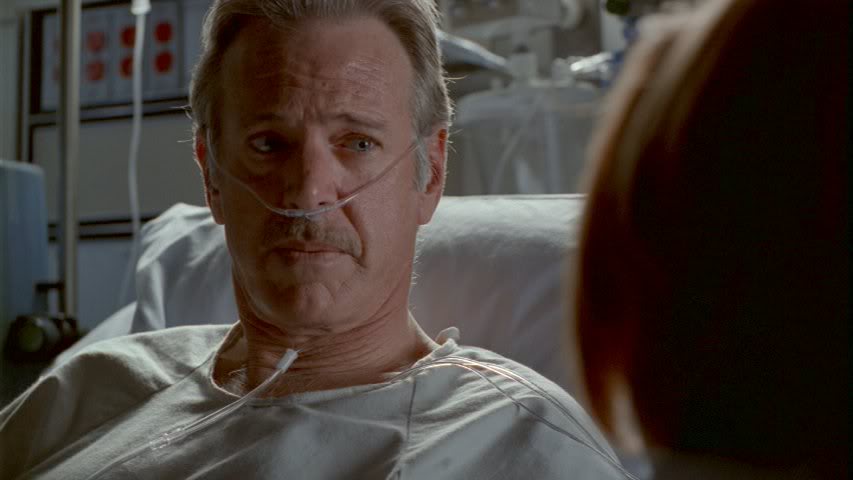
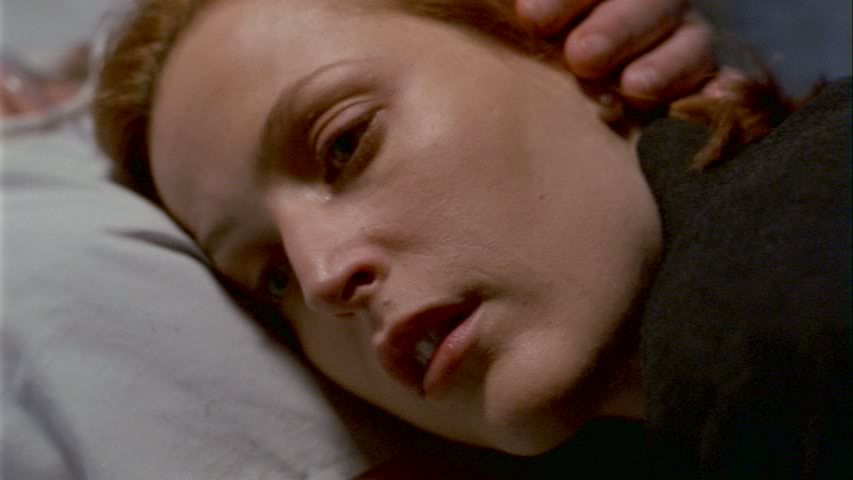
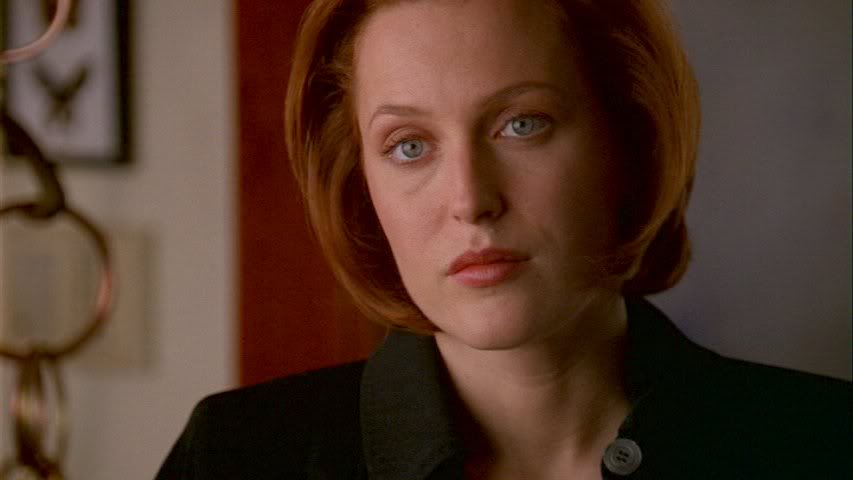
-- The rhythm of the turn signal accompanied Scully's slo-mo moment during her near-miss with a semi. In the original script, there's a bit more of the phone conversation between Mulder and Scully following the near-accident (rather than Mulder just asking her if she's okay). In the original script, she tells Mulder that a woman just saved her life; and he rather insensitively remarks that since her life has just been saved, she can now go pick up the information he wants. During the conversation, Scully pulls to the side of the road, and the drivers behind her honk their car horns in irritation. Then Mulder says, "What are those horns? You just get married or something, Scully?" Personally, I'm glad that odd line got removed from the final cut.
-- Colleen Flynn (Colleen Azar) also played Michelle Fazekas, who led Scully and Mulder into the Florida woods in "Detour." She also had a memorable stint on China Beach as Dr. Colleen Flaherty Richards.
-- On her DVD episode commentary, Gillian Anderson said, "I love having the control to be able to choose people's names," noting that Colleen Azar was named for her friend Edie Azar.
-- Steve Hornyak, who played Dr. Kopeikan in "all things," was the real-life husband of Colleen Flynn.
-- A rotating sprinkler outside Colleen Azar's house takes over the rhythm from the turn signal. "Once a decision for shooting is made, things happen so fast," Anderson recalled in her DVD commentary. "When we found the location for Colleen's house and were driving home from the site, somebody in the transportation department said we 'bought' the house -- that's their term for renting a house or a location. It sounded so huge and final and such a momentous thing, and I started going 'Well, wait, can't we ... what if we change ... suppose we ...' But you soon realize that things have to happen quickly in order for the production to get done in the time allotted."
-- In her DVD commentary, Anderson pointed out that she wanted Colleen's house to have a "warm light and golden quality to once again juxtapose what Scully experiences with Daniel. Scully is taken by it, affected by the warmth, but doesn't know what's going on, doesn't know how comforting and comfortable that feels in comparison." Anderson wanted to have sculptures on the porch that were making comfortable tingling sounds as Scully is waiting, and pointed out the "huge sculpture in the background as Scully is waiting at the door." She added that "there's a big sculpture that we don't see yet that I bought and have hanging outside my home. It's a nice memory of the experience, even though you don't get to see it in the show."
-- Anderson chose works created by artist Gary Christopherson to be displayed in and around Colleen Azar's house. On his website, Christopherson notes that his mobiles and stabiles are abstract sculptures in the tradition of Alexander Calder. They are created from basic elements. Lines represent beginning, negative, or threat. Curves represent change, transition, or evolution. Circles represent being or wholeness, but also at times, nothingness. When these basic elements join and are in motion, the message is "quantum positive change," a strong optimistic expression of the human condition and potential. According to the website, six mobiles and stabiles were selected by Gillian Anderson and rented by The X-Files for use in "all things." The pieces were titled: "A Flight of Whimseys," "The Soft Embrace of Being" (which sold for $4,600), "Upward Reach to Asymmetry," "Bordering on the Edge of Freedom," "Fractured But Being Whole," and "Being Just in Balance" (which sold in a charity auction for $1,900). You can see some of Christopherson's artwork at his website ([url]www.gchris.com)[/url].
-- Anderson felt that the sculptures turning and moving in the wind gave the house a "Japanese feel." She noted that Colleen's house featured "a couple of paintings that a very good friend of mine who's an artist painted and it was important for me to have them in the house."
-- In the original script, Scully drops the envelope that Colleen gives her (to reveal the heart chakra) not on Colleen's front porch, but in Mulder's office at the FBI, where she has gone to prepare the package to send to Mulder. The scene is described this way: "Scully bends down to gather the papers, when one in particular catches her eye. The heading reads 'HEART CHAKRA' and below it is an aerial photo of a crop circle. Scully stares at it. She is, despite herself, surprised by its beauty. She stands, admiring it for a moment. Then takes what feels like her first real breath in a long while. Looking up from her paper, she finds her eyes resting on the bulletin board behind Mulder's desk. At first, a frown forms on her face. Then, after another deep breath, the slightest of smiles. She steps forward and proceeds to study, for what may be the first time, Mulder's clippings. She continues looking at them, moving past the filing cabinet, reaching out to touch them in passing as if -- in doing so -- answers might suddenly form to all her questions. She moves past Mulder's inner office and as she passes the glass partition, something catches her eye. She stops before the glass and turns to see ... her reflection, caught in the flickering strobe of the fluorescent light. But she sees not an image of herself today, but of ... herself, seven years ago, when she first joined the FBI. As the light flickers, the image is replaced with one of her present self. And then back again as if the spastic fluorescent bulb were dictating the projection before her. Suddenly her cell phone rings, diverting her. She lifts the phone to her ear, looking back to the glass -- her image remaining in the present. She's clearly unsettled as she speaks." She says Mulder's name into the phone, but it's actually Dr. Kopeikan asking her to come to the hospital because of a change in Daniel's condition.
-- In her DVD commentary about the next scene, Anderson said, "We have to show them all at odds, Scully at odds with Maggie, and also see Waterston's stubbornness to exemplify the fact that even though he is a brilliant doctor and someone that Scully apparently at one time and still cares a great deal for, is a very heavy-handed influence on her life and not necessarily the direction she should go for. It was important to me in writing the character and the history of their relationship to make it complicated. Relationships are not as cut and dried as we would like them to be. Waterston is very appealing, he has a certain sexiness to him and his intelligence is attractive. They have a history and obviously cared for one another at one time, and sometimes that is enough to blind us from the practical aspects of relationships. Sometimes we accept something as being 'enough' when in fact if we can step back from the situation and look at it from a more centered perspective, we often find that it's actually something that's not right for us. If we can pay attention to these lessons, we see that we don't have to 'settle' for the things that are important to us in life." Anderson added, "In this scene, Scully's not able to see that yet. She's very attached to the past and to the love that she had with this man. Mulder's away and she's in turmoil to a certain degree with Mulder in terms of what he asks of her and expects of her. It's very confusing for her right now."
-- Anderson wanted the moment where Scully realized something was wrong with Daniel's heart to be an intuitive moment (when she had her head on his chest), but it wasn't dramatic enough so she ended up having Scully be alerted by the hospital machines.
-- The turmoil and coldness of Waterston's life and existence is again juxtaposed with Colleen's warm and inviting home, and her warm and loving relationship with her partner. The character of Colleen somewhat parallels Scully, Anderson explained, "a woman who was a scientist, worked incredibly long hours, and that's all she did at the expense of her relationships. Then she get sick and realizes that this was a gift in her life; that sometimes we need to have physical and emotional breakdowns in order to stop us and show us that we are doing things in ways that are not benefiting our greater selves." Colleen then found a creative outlet (sculpting) that essentially attributed to her healing.
-- Carol Banker, who plays Colleen's partner Carol, was a script supervisor for The X-Files. She had also performed script supervising duties on many films, including The Prophecy, Feeling Minnesota, The Apostle, and Dogma. Her role in "all things" was not her first -- she played a security guard in Mallrats.
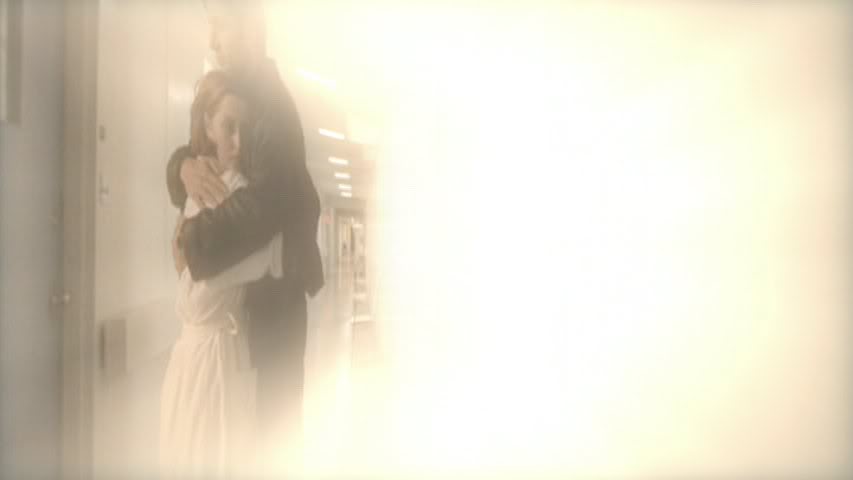
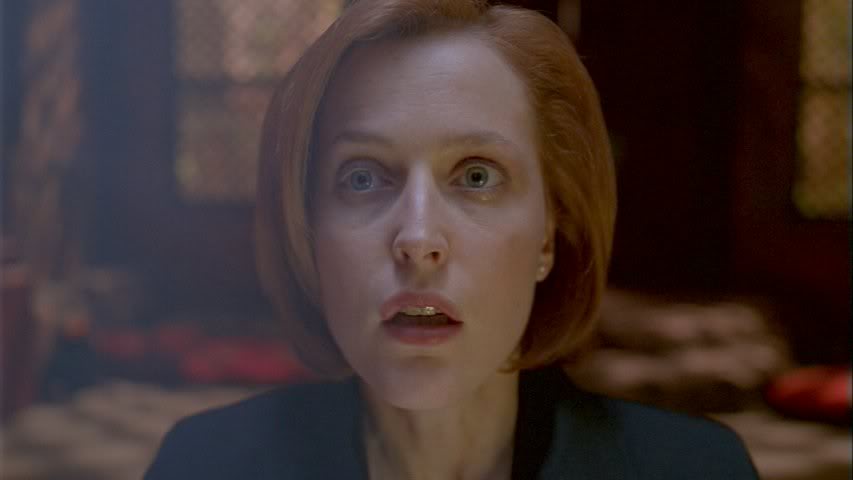
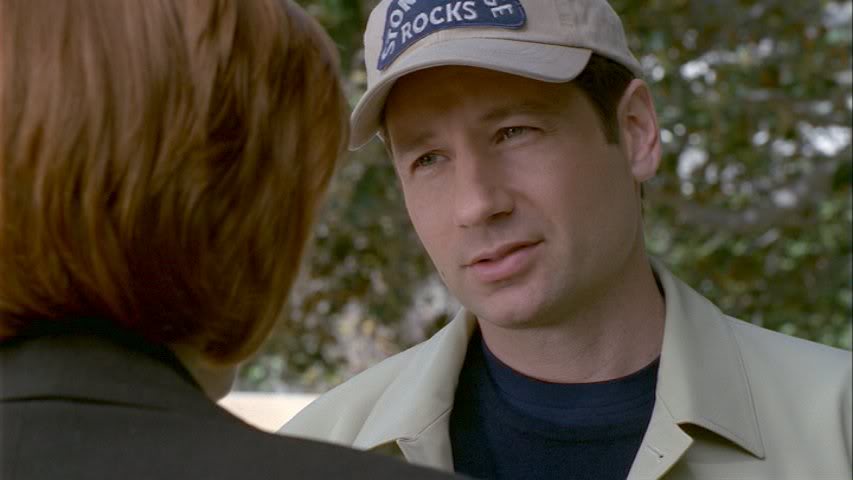
-- In her DVD commentary, Anderson said, "I always felt for Colleen -- the actress as opposed to the character. Her character is all exposition; the things that happen have to move the story forward. In the original script, our second meeting was in Chinatown. Scully walks into an apothecary and was going to go so far as to find some alternative medicine to help heal Daniel when nothing else in the world of western medicine was working. She found herself in the apothecary and as she's preparing to leave, she runs into Colleen. They walk through Chinatown and have a talk with a lot more dialogue, but neither of those things worked out. The importance of showing her environment and which scenes needed to exemplify that in relation to the constant paring down of the script became part of the challenge, but also a huge lesson in letting go and not being attached to things."
-- Scully's slo-mo walk to Moby's music was in part necessitated by having to show how Scully got from the hospital to Chinatown and the rhythmic swinging of the apothecary sign. The swinging sign was supposed to occur following Scully's visit to the apothecary shop (noted above) which was eventually cut from the script. The scene was also changed to tie in the paranormal aspects of once again seeing the woman who disappeared but was leading Scully further on her journey.
-- In her DVD commentary, Anderson noted that "Scully opened a door on a street in Chinatown, but when she steps inside, we're actually on one of the stages at Fox. I remember describing over the phone to Corey [Kaplan] in the art department what I wanted this temple to look like, and she drew me a picture and the first picture was exactly what I had envisioned for this space, and within a few days it was built and in front of me. It was the most miraculous thing."
-- In truth, the behind-the-scenes people pushed extra hard to make sure things ran like clockwork for first-time director Anderson. Production designer Corey Kaplan was one of the first to step up for her. "There was a question in one scene about whether or not to have a Buddhist temple in one pivotal sequence," Kaplan related. "Gillian wanted it but she felt it would be too expensive. But I said, 'I want you to have that Buddhist temple,' and so we rigged up a Buddhist temple in a cellar of one of the stages."
-- Anderson found it difficult to relate to the special effects staff her vision of the pictures that would flash by Scully during her scene in the temple. "I was trying to describe over the phone what I wanted those pictures to look like as they flashed by and trying to put words to what I had in my head was such a challenge. A lot of patience was involved." Just for the record, and to save the wear and tear on your pause button, here are the "important moments" from Scully's life that go rushing by during her vision (in order): her family at her father's funeral; her father as he appeared to her in dress whites in "One Breath"; her mother; Mulder; Melissa; CSM; herself at her first meeting with Mulder (with the IWTB poster behind her); Colleen Azar; herself holding Emily; herself and Mulder looking up at the UFO from "Deep Throat"; Mulder holding her in the hallway in "Memento Mori"; herself just before she was abducted by Duane Barry; and finally, a transparent Daniel with a black heart.
-- In her DVD commentary, after watching the scene of Scully's dream (where she sees herself with cancer lying in the bed), Anderson jokes, "I don't know how many times Scully's been in bed with her pajamas and answering the phone -- I don't think she's ever worn the same pajamas twice."
-- In the original script, when a recovered Daniel asks Scully where she got the ideas for the "voodoo ritual" that was performed on him, she replies, "I got them from my partner at the FBI." Daniel says, "Well, then your partner's had a delusionary influence on you." To which Scully replies, "No. He's had a great impact."
-- In her DVD commentary, Anderson said the final scene with Daniel "was a defining moment for Scully. She is finally able to stand up to Waterston because of the course of the journey and where she's been lead and the realizations that have come to her as a result of paying attention and listening to her own heart and her own needs. This episode was really the beginning of Scully on a more spiritual than religious path and that's a lot of my doing. I'm not a religious person, but I try to be a spiritual person; and Scully standing up against someone that she cares for very much but who believes in none of it is part of Scully's journey. Even in Mulder's absence, she's able to open up to a whole other world as she sees how one event in life leads to another and comes to appreciate the cause and effect and cyclical aspect of human life. In her own way, Maggie has come to the same sense of peace not only in understanding that it's not Scully's fault, but in her need to confront issues with her father and be in a place of forgiveness and love. She wants to move forward and make things work out."
-- For the scene where Scully discovers the true identity of the mystery woman who has been leading her on her journey, Anderson explained that "Originally we shot three of these sequences, the one used in the episode being the last. The first was outside of the hospital room. Scully was going to leave and the camera encircled her, and that dissolved to a scene of Scully sitting on a pew in the hospital chapel, but her hands are placed in more of a meditative way so she's sitting in church but she's meditating, a leap for her character. I liked the juxtaposition of that and what that represented. And then the one which was time-wise the one we ended up keeping where the woman is revealed to be Mulder."
-- Though Anderson doesn't mention it in her commentary, it's probably no coincidence that Mulder is wrong not once but twice in this episode (he's wrong about case mentioned in the very beginning where the girl drowned in Margarita mix and he's wrong about the crop circles).
-- After Scully says she's going to make Mulder some tea, the original script says that "she leads him off, hand in hand." Wish they'd kept that in.
-- Regarding the final scene, Anderson said, "This scene, I love this scene. But Scully had to be tired enough and slurry enough that it would make sense that she would actually fall asleep by the end of this scene which is a tall order, so she mumbles a bit, and I love how the music ties into this. I love the fish tank in the background, I love that she falls asleep with her head on his shoulder and he keeps rambling and there's so much care in the way that Mulder looks at Scully and moves her hair to the side and the way he covers her with the blanket. And here we have the through line of the slow motion again. These moments that are so important in our lives whether we are asleep or awake for them, they're still there." (After all, the final slo-mo sequence is an important potentially life-altering moment for Mulder too!)
-- Anderson continued, "I wanted this two-shot of them and then the camera to leave them and you're not quite sure if he's leaving or moving her to the bed or what the situation is. The camera moves over and ... Lisen in the set decoration department put the UFO in the fish tank, which was such a fantastic touch. And then moving the camera down to what it's really all about [the little Buddha], and finally Moby. Then the challenge of finding that last moment in the editing process -- should the music stop before, or should it go on into the credits?"
-- The result of this admittedly risky departure from the dark and frightening nature of X-Files cases was a happy surprise. Calls and letters indicated that viewers loved the vulnerability and quiet determination that Scully revealed in the unusual episode. They were equally impressed with Anderson's directorial skills. She was happy. "When it was all over, I realized I knew more than I thought I did."
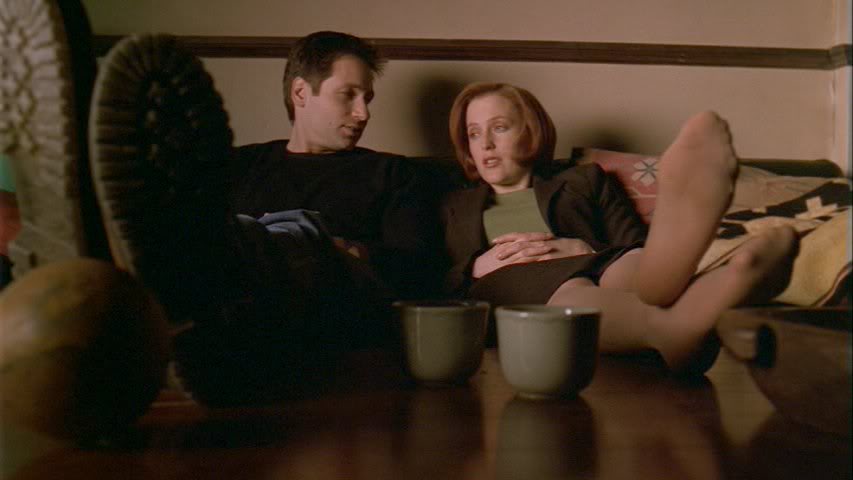
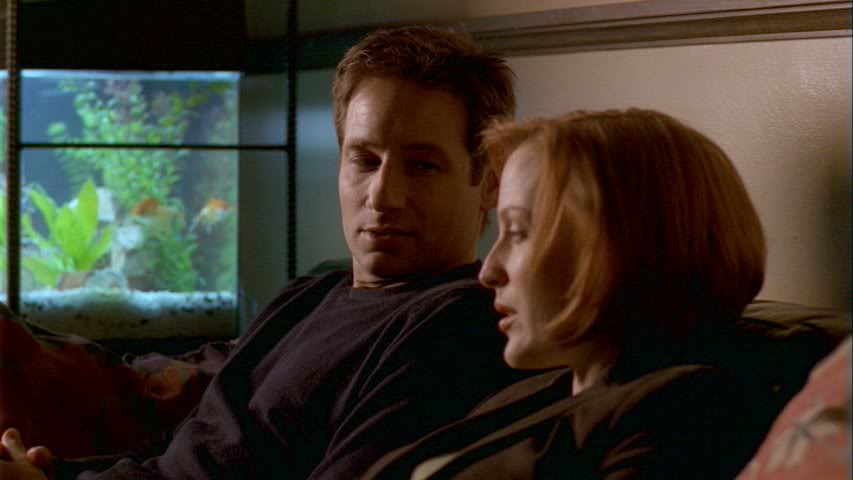
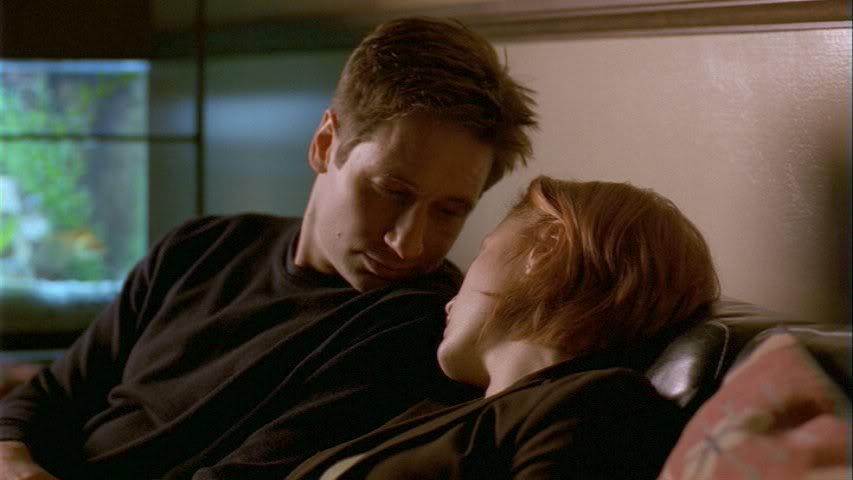
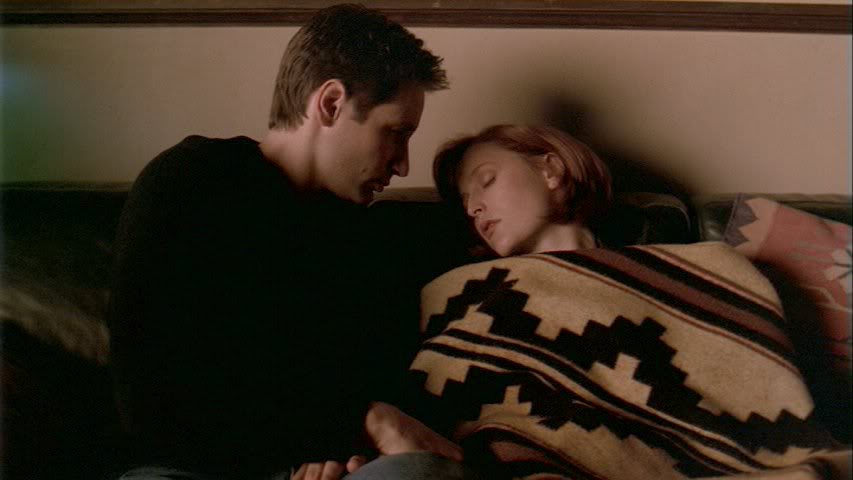
(Thanks to chrisnu for today's episode pics.)
Please share your first impressions, favorite (or cringe-worthy) moments, classic lines, favorite fanfic, nagging questions, repeated viewing observations, etc., as today we celebrate "all things"!
Polly